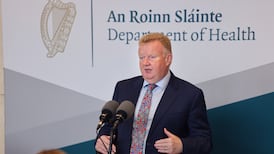Olive O’Connor knew in her gut that something wasn’t right with her new born baby, but no one would listen to her. Nurses said she was being over protective or mollycoddling.
“I was like, ‘hold on a second there’s definitely something wrong, I’m not mollycoddling – There’s something wrong with my baby’,” says Olive. “I kept being dismissed. My GP was on holiday, so I brought her down to A&E. Basically, they told me that I had post-natal depression and that the baby was fine, there was nothing wrong with her and to go home.”
Her daughter continued to lose weight and sleep excessively and when she started to go limp Olive paid a second visit to A&E. This time she demanded that her 12-day-old daughter be admitted for assessment. The hospital complied on condition that Olive agreed to be assessed herself. She says she would have consented to anything at this point, she was so terrified something awful was going to happen to her daughter.
That night a nurse asked Olive whether she had heard of Munchausen’s. She hadn’t. In fact, she responded by asking the nurse if that’s what her baby had been diagnosed with. She now knows that the inference in the question was that she was making up symptoms for attention.
Next morning, the doctor said her baby had a heart murmur. He sent mother and baby home saying there was nothing to worry about. But Olive didn’t go home, she went to her GP who was back from holiday. He listened to Olive’s concerns, assessed her baby and arranged for her to be seen at another hospital.
The doctor at this hospital told Olive and her husband that their baby had three holes in her heart and needed to go to Crumlin hospital for further investigation.
They drove to Crumlin only to have a cardiologist there tell them to take their baby back home as there was nothing to worry about. Distraught, Olive left the hospital. To this day she has no recollection of where she went. She just walked. While she was gone her husband asked for a second opinion. When she returned the second cardiologist told the couple that their daughter needed heart surgery and heart medication. She also needed special food and had to be tube fed because she had become so weak and lethargic.
Despite almost losing her child to medical gaslighting, Olive doesn’t believe that the health professionals who dismissed her did it intentionally. When the doctors and nurses failed to take her concerns seriously, they were likely acting on their implicit bias that mothers can be over protective and can become hysterical about their children’s health. When people, are stressed, overworked or tired, as many health professionals are, they are more likely to act in an unconscious biased way.
By dismissing Olive’s unease as irrational, the nurses and doctors missed valuable information about the baby’s wellbeing. What Olive described as a gut feeling, was likely a cumulation of her observations of her baby, her experience as a mother of three, as well as subtle warning signs that Olive herself may not even have registered consciously.
Medical gaslighting happens when health-care professionals downplay or explain away symptoms with non-medical or emotional reasons. This leads patients or parents to doubt themselves or think they are exaggerating. It can result in more and prolonged pain for the patient and may even put lives at risk. Medical gaslighting is more likely to be experienced by women than men.
Donna Nahal describes herself as a happy, energetic, but naive 16-year-old when she visited her GP. She says: "I made repeated visits over a 12-month period with the same complaint. My foot was dropping, and I was having multiple falls."
Migraine is a debilitating neurological condition that is three times more common in women than men
She says that her GP responded by asking her whether everything was okay at home and was she worried about her studies.” At 17, Donna was diagnosed with multiple sclerosis, a neurological disease that affects three times more women than men.
Rachel Lynch says she was told "that my migraine was due to anxiety, that I was a lovely girl who was just a bit of a worrier and if I did a bit of CBT, I'd be grand."
Migraine is a debilitating neurological condition that is three times more common in women than men. Dr Martin Rutledge, a neurologist who specialises in migraine says "many patients will say that the doctors and medical professionals believe that they are exaggerating their symptoms, or they are making up some of their symptoms". He explains that the problem is that you can't measure migraine, there is nothing that you can objectively say is wrong with the patients, because you can't measure anything."
Women are more likely to experience chronic pain than men but less likely to receive treatment despite the fact that their pain is more severe, longer lasting and more likely to recur than pain in men. Even when women present with similar health problems to men, women are likely to receive a lower quality of care to men.

The Women's Brain Project focuses on sex and gender determinants of health as a gateway to precision medicine. It's president Dr Annemarie Schumacher Dimeche (University of Lucern) says that women experience pain differently to men due to anatomical, physiological, neuronal, hormonal, genetic and psychosocial factors. When men and women present with chest pain the men are 2.5 times more likely to be referred to a cardiologist. Cardiovascular disease affects women differently than men in terms of symptoms, risk factors and outcomes. Despite this, only a third of clinical trial participants are women. Cardiovascular disease is a leading cause of death in women, yet women are seven times more likely than men to be misdiagnosed and discharged while actively having a heart attack.
It’s highly unlikely that this is intentional. It’s far more likely to be a result of unconscious gender biases or stereotypical views by medical professionals or a failure to acknowledge the differences that exist between women and men.
Dr Marie Theresa Ferretti, neuroscientist, co-founder and CSO of the Women's Brain Project, says the same symptoms that tend to be attributed to organic disease in men, are much more likely to be diagnosed as anxiety or panic attacks in women. Women with acute pain are less likely to get opioid drugs and more likely to receive sedatives. Dr Ferretti views the recognition of mental health issues in women as a positive, but she argues that it becomes problematic if doctors dismiss the original symptoms because the women may end up with an incorrect diagnosis or ongoing pain.
Despite presenting to her GP with hip pain for years, Tina, who has fibromyalgia, was never offered an x-ray
Keira says that the gaslighting that she experienced following surgery for breast cancer was more to do with pain than the cancer itself. She says: “My internal stitches had ripped but no one would believe me or believe that I was in pain. So it took 10 days for the mistake to be identified. I was treated as if I was drug seeking, over anxious or somehow a problem patient.”
Dr Cliona Loughnane, Women's Health Coordinator at the National Women's Council of Ireland, says that medical gaslighting comes up as an issue on their Women's Health Programs. She says that unfortunately many women feel that they are not listened to or that they are viewed as overdramatising or catastrophising. She points to the history of healthcare scandals in Ireland and says: "it is notable how many of them have impacted on women and women's health specifically - symphysiotomy, the Anti-D, and the cervical check."
Despite presenting to her GP with hip pain for years, Tina, who has fibromyalgia, was never offered an x-ray. It was only when she reached a point of being unable to put any weight on her leg that she was finally sent for an x-ray, which revealed osteoarthritis. She is currently on the waiting list for a hip replacement, uses a wheelchair and can no longer walk unaided. She says; “In my experience doctors tend to put every ailment down to fibromyalgia. I am scared that in the future another serious condition will be missed.”
Dr Ui May Tan, GP and Health and Wellbeing Clinical Lead at the VHI, says that people presenting with chronic conditions are the most vulnerable to gaslighting. She explains: “If a patient gets diagnosed with a specific chronic condition that they don’t fully understand it’s likely that they’ll present more often to their GP who will be biased towards thinking that this new symptom is actually linked with the patient’s original diagnosis. So, the symptom can get brushed aside.”
Dr John Fitzsimons, Clinical Lead for Quality Improvement in the HSE, implements ongoing training of doctors with a specific focus on patient safety. He employs implicit bias testing to educate doctors about how beliefs and biases influence interactions with patients. He says doctors are shocked to discover their implicit biases. He believes that more awareness and research is needed about how unconscious beliefs and hidden biases influence health professional's perceptions, judgements and actions.
Olive's daughter is doing well and Olive is now actively involved with the RCSI and RCPI in educating health professionals about the importance of listening to parent's concerns. Her personal experience led to her being part of a group of health professionals and parents, chaired by Dr John Fitzsimons, that changed the Irish Paediatric Early Warning System (PEWS) to include parental concern as a core parameter and important indicator of the level of illness of a child.
- Dr Sabina Brennan is a psychologist, neuroscientist, and author and host of the Super Brain podcast, superbrain.ie










